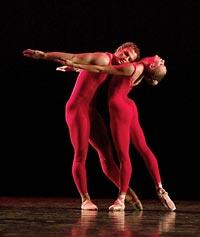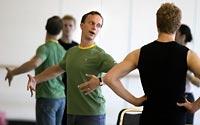Director Peter Boal has brought a new luster to PNB

This was the year that brought Frank Sinatra, the Cramps and rope harnesses to Pacific Northwest Ballet. But most of all, it was the year that brought Peter Boal.
Nobody knew quite what to expect when Boal, then a 39-year-old dancer only just retired from a distinguished 22-year performing career at New York City Ballet, took over the reins at Seattle's premiere dance company at the end of last season. Under the longtime guidance of Francia Russell and Kent Stowell, co-artistic directors since 1977, PNB had developed from a small local group to one of the country's premiere regional companies, particularly known for its performances of the work of George Balanchine. Boal, except for a couple of seasons with his own four-dancer troupe Peter Boal & Company, had never run a ballet company before. As he stood before the curtain at the opening performance of the season, a small man with a friendly, informal manner, longtime PNB watchers wondered how this stranger would affect and shape the company we knew so well.
Now, a year later, we know the early answer: splendidly, thank you. Boal has brought youthful energy to the company, as well as a dance bag full of new-to-PNB works, many chosen from choreographers for whom Boal himself danced. Among the dancers, new faces are emerging from the corps de ballet as future stars, while the veterans are dancing with renewed vigor.
And that energy isn't just up on the stage: People are talking about PNB, in a way that they haven't for a long time, in the McCaw Hall lobby and out in the community. Dance lovers who haven't been to the ballet in ages are talking excitedly about getting tickets, about how "the new guy" is presenting work they want to see.
As PNB prepares to close the season under the festive banner of Balanchine's "Jewels," it's a good time to look back at a year that could well mark a crossroads for the company.
"I've been given this gift of a bigger canvas to paint on ... "
— Peter Boal, spring 2005
The selection of the Jerome Robbins ballet "In the Night" to open the season was a telling and confident one — Boal started off not with a bang, but with a lovely whisper. It's a quiet three-couple nocturne, set to Chopin, and a very personal choice for Boal, signifying his connections with ballet history (Boal worked closely with Robbins at NYCB for many years). PNB's dancers (particularly Louise Nadeau and Christophe Maraval) seemed to be dancing with heightened emotions; each tiny movement made meaningful as the delicate music played.
Boal's selection of many new-to-PNB choreographers brought many new names to the company this season, and the dancers seemed to relish the challenges each presented. In particular, the February repertory evening "Valentine" provided a marvelous showcase: The red-clad cast of Ulysses Dove's contemporary ballet "Red Angels" marched toward the front of the stage as if going to war, while "Kiss," Susan Marshall's exquisite rope-swung love duet, was performed with a delicate yearning.
Among the new-to-PNB works, only Dominique Dumais' portentous "Time and other Matter" disappointed. But even that provided room for dancers to shine. One of the year's great pleasures has been in seeing corps de ballet members step into the spotlight in featured roles: Stacy Lowenberg in "Time and other Matter," Chalnessa Eames and Anton Pankevitch in "Nine Sinatra Songs," Kiyon Gaines in "Sleeping Beauty," James Moore and Kari Brunson in "Kiss." Their work bodes well for PNB's future.
It's not that PNB hasn't showcased contemporary choreographers before — or danced their work well — but this year marked a change in that so many were new to the company. Boal, as a solo artistic director who is not a choreographer, brought that variety; with Stowell/Russell, PNB out of necessity performed a great deal of Stowell's work.
But the company's classical backbone was well-exercised this year as well, with the repertory showcasing the company's principal ballerinas: Patricia Barker (celebrating her 25th year with the company, and still going strong) soared in "Nutcracker"; Nadeau led a haunting "La Valse"; Kaori Nakamura was a delicate powerhouse of an Aurora in "Sleeping Beauty." Among their male counterparts, Olivier Wevers and Maraval were standouts this year, with new principal Jonathan Porretta making a strong impression.
Offstage, PNB is still in recovery mode; the company lost a number of subscribers with the temporary move to Mercer Arena for the 2002-2003 season (during McCaw Hall's renovations) and is still making up ground. Executive director D. David Brown said the subscriber base was approximately 12,000 before the move, dropped to about 9,000 and now is up to about 10,500. But it was a strong year for single ticket sales (the repertory evening "Valentine" attracted three times the expected number of single ticket purchases), and Brown said the company is "cautiously optimistic" of ending the year with a surplus.
Under Boal's leadership, PNB is making a conscious effort to attract a wide spectrum of audience members. "Some people feel there's a divide — that ballet is for a certain type of person, maybe a certain income level, a certain age," said Boal. "With the ballets that I'm choosing, I want the public to know that ballet can be for everyone, regardless of age, regardless of income." He noted that the company has just dropped its lowest ticket price (from $20 to $18), expanded the number of lowest-priced seats available and will continue its popular "$5 Fridays" discussion/demonstration program next year. And ticket sales are on target for "Jewels," to conclude the season.
"Just as Balanchine loved to feed his dancers champagne and caviar and clothe them in fine perfume and French silk, now he wanted to cover us with precious stones."
— Suzanne Farrell, "Holding on to the Air: An Autobiography"
Choreographed in 1967 as the first full-length new work for New York City Ballet's new New York State Theater, "Jewels" was a showpiece for the elegant new performing space — and a celebration of ballet itself, with its three plotless sections each embracing a different style of the art form. It became famous as the first full-length plotless ballet, but its three parts can easily be shown individually. (PNB has performed "Rubies" multiple times in the past, most recently in 1997.) Shown together, as PNB is doing for its first time, it is a primer course in ballet, and in Balanchine.
"Emeralds," set to a gentle, moody score by Gabriel Faure, is soft and romantic, in the French classical tradition. "Rubies" is upbeat jazz, with spiky body positions and jutting hips, accompanied by Stravinsky; it's one of Balanchine's perfect marriages of music and movement, as so often happened in his collaborations with the composer. "Diamonds," which concludes the evening, is regal and Russian; its central pas de deux is one of reverence, both for the ballerina at its center (the dance ends with the man sinking on one knee to kiss her hand) and for ballet itself.
Balanchine created the lead female role in "Diamonds" for a young Suzanne Farrell, who would go on to become perhaps America's greatest ballerina, as well as muse for many Balanchine roles. In recognition of ballet's hand-to-hand history, Boal arranged for Farrell (from whom he performed in The Suzanne Farrell Ballet) to visit PNB to work with the lead "Diamonds" couple, Barker and Stanko Milov. In a quiet studio, the soft-voiced Farrell remembered details of the choreography, passing them along with a touch or a word; a direct link from the work's creator.
It's a rare opportunity to see the full-length "Jewels," and its selection nicely concludes a season of treasures old and new. "I like the fact that PNB had the history of doing 'Rubies,' the history with Balanchine, and never done 'Jewels' in its entirety," Boal said. "I was able to follow the traditions and at the same time bring something completely new to the public and to the dancers."
Moira Macdonald: 206-464-2725 or mmacdonald@seattletimes.com

Coming up
"Jewels," presented by Pacific Northwest Ballet, 7:30 p.m. June 1-3 and 8-10, 2 p.m. June 3 and June 10, 1:00 p.m. June 11, Marion Oliver McCaw Hall, 321 Mercer Street, Seattle; $20-$134, 206-441-2424 or www.pnb.org.
PNB will wrap up its year with something new: a one-night-only evening of favorites from the season. "8 Encores" will include "Rubies," "Kiss," "Mopey," "Jardi Tancat," "Red Angels," and selections from "In the Night," "Nine Sinatra Songs" and "Time and other Matter." Sunday, June 11 at 6:30 p.m.; tickets are $20 to $134 and available through the PNB Box Office at 206-441-2424 or www.pnb.org.